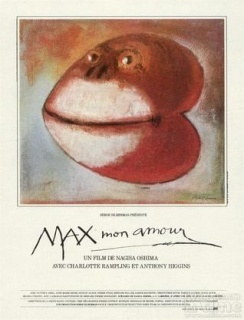马克斯我的爱
- 主演:
- 夏洛特·兰普林,安东尼·希金斯,维多利亚·阿夫里尔,Anne-MarieJoubert
- 备注:
- HD
- 类型:
- 美丽片
- 导演:
- 大岛渚
- 年代:
- 1986
- 地区:
- 法国
- 语言:
- 法语
- 更新:
- 2023-05-30 09:49
- 简介:
- 英国外交官彼得·琼斯(安东尼·希金斯饰)与妻子玛格丽特(夏洛特·兰普林饰)和儿子纳尔逊(克里斯托弗·霍维克饰)住在巴黎大使馆。妻子的频繁外出让彼得起了疑心,他通过侦探得知了玛格丽特租住的公寓,就跟着他走了。却发现他的妻子和一只猩猩躺在一起。彼得一度想杀掉这只名叫麦克斯.....详细
马克斯我的爱剧情简介
美丽片《马克斯我的爱》由夏洛特·兰普林,安东尼·希金斯,维多利亚·阿夫里尔,Anne-MarieJoubert主演,1986年法国地区发行,欢迎点播。
英国外交官彼得·琼斯(安东尼·希金斯饰)与妻子玛格丽特(夏洛特·兰普林饰)和儿子纳尔逊(克里斯托弗·霍维克饰)住在巴黎大使馆。妻子的频繁外出让彼得起了疑心,他通过侦探得知了玛格丽特租住的公寓,就跟着他走了。却发现他的妻子和一只猩猩躺在一起。彼得一度想杀掉这只名叫麦克斯的猩猩,但最后还是把它带回家了,但麦克斯和玛格丽特暧昧的关系总是让他不知所措让他感到尴尬或恐慌……日本新浪A洋超导演大岛渚执导的语言电影。一个女人爱上了一只猩猩,这个想法相当大胆,导演是大岛渚。这个世界上的很多事情是常人无法理解的,但伏尔泰已经告诉我们:我不同意你的观点,但我捍卫你的话语权。
{if:"MAX, MON AMOUR received a tepid reaction when it debuted inCannes in 1986, a French-American co-production under the rein of the late Japanese provocateurNagisa Ôshima (1932-2013),which would become his penultimate feature film.Since then, it has become a succès de scandale which isless being watched than hyped due to its subversive content, but in fact, most of the time, it suffices as a tongue-in-cheek comedy, a marital satire borne out ofJean-Claude Carrière’s urtext, Peter Jones (Higgins) isa liberal-minded British diplomat working and living in Paris, one day, to his utter dismay, he finds out the paramour of his wife Margaret (Rampling), is a male chimpanzee named Max, beggar belief, the couple decides to try out a kind ofménage-à-trois by bringing Max into their official residence, where also lives their towhead school-age son Nelson (Hovik), and believe it or not, in the end of the story, their co-habitation actually works. Cagey about the salacious details of the relationship between Margaret and her“supposed" primate lover,Ôshima sides with the husband’s point-of-view to parse the couple's tug-of-war, firstly, Peter takes up the gauntlet to show his magnanimity by accepting the situation without letting it get under his skin, then, driven by curiosity and jealousy, his attitude towards Max seesaws between hostility and respectable concern, an experiment of corroborating the inter-species sexual act is a bust, whereas an episode of shotgun scare is just a cheeky practice of cheap tension.It is an immoral cock-and-bull story, menace is palpable, but vice has never descended into the picture andwhat sagaciously affirming is the film’s brazen stance on the dynamism between the couple, it is always Margaret who has the say-so in their states of affairs, however preposterous and quixotic, there is a deep respect unites them as an entity, Peter stoutly fights her corner in the face of extrinsic parties, whether it is a zoologist or a neuropsychologist, accordingly, she also quite frank about her feelings, even stays on friendly terms with Peter’s secretary-cum-lover Camille (a gratingly loud Diana Quick).It is a surprise that Ôshima chooses not to go out on a limb in salting the plot by bestowing Max with a feral complexion, alternatively played by real chimps and stunts in verisimilar costumes (solely by this reviewer’s reckoning), Max is presented as a meek pet, not dangerous, sulky at most, albeit his human-like size, even becomes mawkishly lovelorn and loses his appetite when Margaret is absent. Granted, there is a touching and tender naiveness seething beneath its surrealistic premise, which also is not exactly congruent withÔshima’s make-up if one might venture to surmise.Both Rampling and Higgins tackle the thorny subject with bravura, what percolates from their collective effort is a beguilingly unfeigned sophistication stemming from a bourgeois background, andÔshima conspiratorially sends up their caprices with deadpan seriousness, not to mention a non sequitur triumph appended to the part where Max momentarily goes missing in the woods.Ultimately, MAX, MON AMOUR doesn’t come to provoke moralists, but offers a keyhole for the audience to observe a behavioral pattern says as much of living beings' universality as of their idiosyncrasy, the point is made, but reverberations are somewhat deadened when Ôshima settles for a middle road between "funny and die" in his overall approach.referential point:Ôshima’s MERRY CHRISTMAS MR. LAWRENCE (1983, 8.5/10)"<>"" && "MAX, MON AMOUR received a tepid reaction when it debuted inCannes in 1986, a French-American co-production under the rein of the late Japanese provocateurNagisa Ôshima (1932-2013),which would become his penultimate feature film.Since then, it has become a succès de scandale which isless being watched than hyped due to its subversive content, but in fact, most of the time, it suffices as a tongue-in-cheek comedy, a marital satire borne out ofJean-Claude Carrière’s urtext, Peter Jones (Higgins) isa liberal-minded British diplomat working and living in Paris, one day, to his utter dismay, he finds out the paramour of his wife Margaret (Rampling), is a male chimpanzee named Max, beggar belief, the couple decides to try out a kind ofménage-à-trois by bringing Max into their official residence, where also lives their towhead school-age son Nelson (Hovik), and believe it or not, in the end of the story, their co-habitation actually works. Cagey about the salacious details of the relationship between Margaret and her“supposed" primate lover,Ôshima sides with the husband’s point-of-view to parse the couple's tug-of-war, firstly, Peter takes up the gauntlet to show his magnanimity by accepting the situation without letting it get under his skin, then, driven by curiosity and jealousy, his attitude towards Max seesaws between hostility and respectable concern, an experiment of corroborating the inter-species sexual act is a bust, whereas an episode of shotgun scare is just a cheeky practice of cheap tension.It is an immoral cock-and-bull story, menace is palpable, but vice has never descended into the picture andwhat sagaciously affirming is the film’s brazen stance on the dynamism between the couple, it is always Margaret who has the say-so in their states of affairs, however preposterous and quixotic, there is a deep respect unites them as an entity, Peter stoutly fights her corner in the face of extrinsic parties, whether it is a zoologist or a neuropsychologist, accordingly, she also quite frank about her feelings, even stays on friendly terms with Peter’s secretary-cum-lover Camille (a gratingly loud Diana Quick).It is a surprise that Ôshima chooses not to go out on a limb in salting the plot by bestowing Max with a feral complexion, alternatively played by real chimps and stunts in verisimilar costumes (solely by this reviewer’s reckoning), Max is presented as a meek pet, not dangerous, sulky at most, albeit his human-like size, even becomes mawkishly lovelorn and loses his appetite when Margaret is absent. Granted, there is a touching and tender naiveness seething beneath its surrealistic premise, which also is not exactly congruent withÔshima’s make-up if one might venture to surmise.Both Rampling and Higgins tackle the thorny subject with bravura, what percolates from their collective effort is a beguilingly unfeigned sophistication stemming from a bourgeois background, andÔshima conspiratorially sends up their caprices with deadpan seriousness, not to mention a non sequitur triumph appended to the part where Max momentarily goes missing in the woods.Ultimately, MAX, MON AMOUR doesn’t come to provoke moralists, but offers a keyhole for the audience to observe a behavioral pattern says as much of living beings' universality as of their idiosyncrasy, the point is made, but reverberations are somewhat deadened when Ôshima settles for a middle road between "funny and die" in his overall approach.referential point:Ôshima’s MERRY CHRISTMAS MR. LAWRENCE (1983, 8.5/10)"<>"暂时没有网友评论该影片"}
@豆瓣短评
MAX, MON AMOUR received a tepid reaction when it debuted inCannes in 1986, a French-American co-production under the rein of the late Japanese provocateurNagisa Ôshima (1932-2013),which would become his penultimate feature film.Since then, it has become a succès de scandale which isless being watched than hyped due to its subversive content, but in fact, most of the time, it suffices as a tongue-in-cheek comedy, a marital satire borne out ofJean-Claude Carrière’s urtext, Peter Jones (Higgins) isa liberal-minded British diplomat working and living in Paris, one day, to his utter dismay, he finds out the paramour of his wife Margaret (Rampling), is a male chimpanzee named Max, beggar belief, the couple decides to try out a kind ofménage-à-trois by bringing Max into their official residence, where also lives their towhead school-age son Nelson (Hovik), and believe it or not, in the end of the story, their co-habitation actually works. Cagey about the salacious details of the relationship between Margaret and her“supposed" primate lover,Ôshima sides with the husband’s point-of-view to parse the couple's tug-of-war, firstly, Peter takes up the gauntlet to show his magnanimity by accepting the situation without letting it get under his skin, then, driven by curiosity and jealousy, his attitude towards Max seesaws between hostility and respectable concern, an experiment of corroborating the inter-species sexual act is a bust, whereas an episode of shotgun scare is just a cheeky practice of cheap tension.It is an immoral cock-and-bull story, menace is palpable, but vice has never descended into the picture andwhat sagaciously affirming is the film’s brazen stance on the dynamism between the couple, it is always Margaret who has the say-so in their states of affairs, however preposterous and quixotic, there is a deep respect unites them as an entity, Peter stoutly fights her corner in the face of extrinsic parties, whether it is a zoologist or a neuropsychologist, accordingly, she also quite frank about her feelings, even stays on friendly terms with Peter’s secretary-cum-lover Camille (a gratingly loud Diana Quick).It is a surprise that Ôshima chooses not to go out on a limb in salting the plot by bestowing Max with a feral complexion, alternatively played by real chimps and stunts in verisimilar costumes (solely by this reviewer’s reckoning), Max is presented as a meek pet, not dangerous, sulky at most, albeit his human-like size, even becomes mawkishly lovelorn and loses his appetite when Margaret is absent. Granted, there is a touching and tender naiveness seething beneath its surrealistic premise, which also is not exactly congruent withÔshima’s make-up if one might venture to surmise.Both Rampling and Higgins tackle the thorny subject with bravura, what percolates from their collective effort is a beguilingly unfeigned sophistication stemming from a bourgeois background, andÔshima conspiratorially sends up their caprices with deadpan seriousness, not to mention a non sequitur triumph appended to the part where Max momentarily goes missing in the woods.Ultimately, MAX, MON AMOUR doesn’t come to provoke moralists, but offers a keyhole for the audience to observe a behavioral pattern says as much of living beings' universality as of their idiosyncrasy, the point is made, but reverberations are somewhat deadened when Ôshima settles for a middle road between "funny and die" in his overall approach.referential point:Ôshima’s MERRY CHRISTMAS MR. LAWRENCE (1983, 8.5/10)
{end if}


















